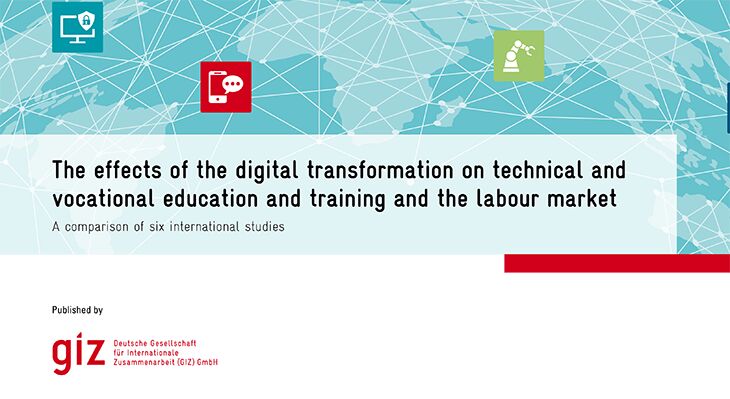What are the effects of the digital transformation on TVET and the labour market?
Robotics and automation, artificial intelligence, big data: ‘Future of work’ is currently an important issue for the future development of TVET in development cooperation. A paper published by GIZ analyses six studies that have addressed this issue, while focusing on aspects with a bearing on TVET.

The effects of the digital transformation and the globalisation of work on employment are frequently called ‘future of work’, ‘new work’ or ‘work 4.0’. This issue is currently very important for the future development of TVET in development cooperation. The concern here is with how changes in work and employment in developing countries will affect TVET in development cooperation.
Many publications deal with the question of what impacts technological change – especially robotics and automation, artificial intelligence, big data, social media and digital communication – and globalisation will have on the world of work. The emergence of the platform or gig economy is a major trend. These changes will affect the organisation of employment relationships, job profiles and the requisite skills. The present paper analyses six studies that have addressed these issues, while focusing on aspects with a bearing on TVET. The studies under review are:
- The OECD’s Employment Outlook 2019: The Future of Work
- ILO’s Work for a Brighter Future
- The World Bank’s World Development Report 2019: The Changing Nature of Work
- World Economic Forum (WEF)’s The Future of Jobs Report 2018
- PriceWaterhouseCooper (PwC)’s Preparing for Tomorrow’s Workforce Today
- The Bertelsmann Foundation’s Berufsbildung für eine digitale Arbeitswelt (available only in German)
The present paper is the second part of a series of publications that the TVET sector project ‘Technical and Vocational Education and Training’ provides at irregular intervals. Each of these papers examines a specific aspect of the issues described above. The aim is to compile concise, relevant information, to illustrate this with good practices, and then to make practical recommendations for both development advice and implementation based on this.